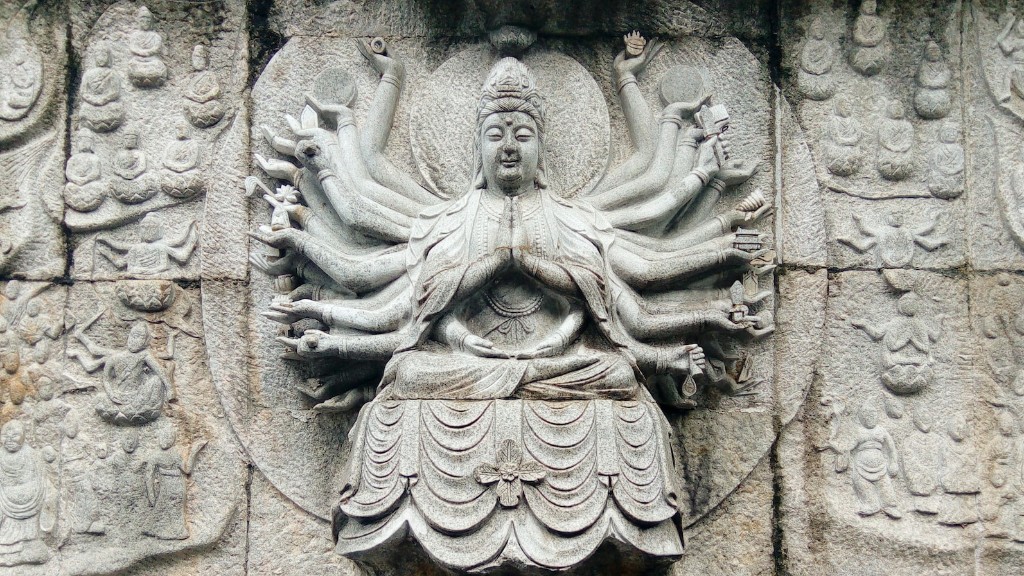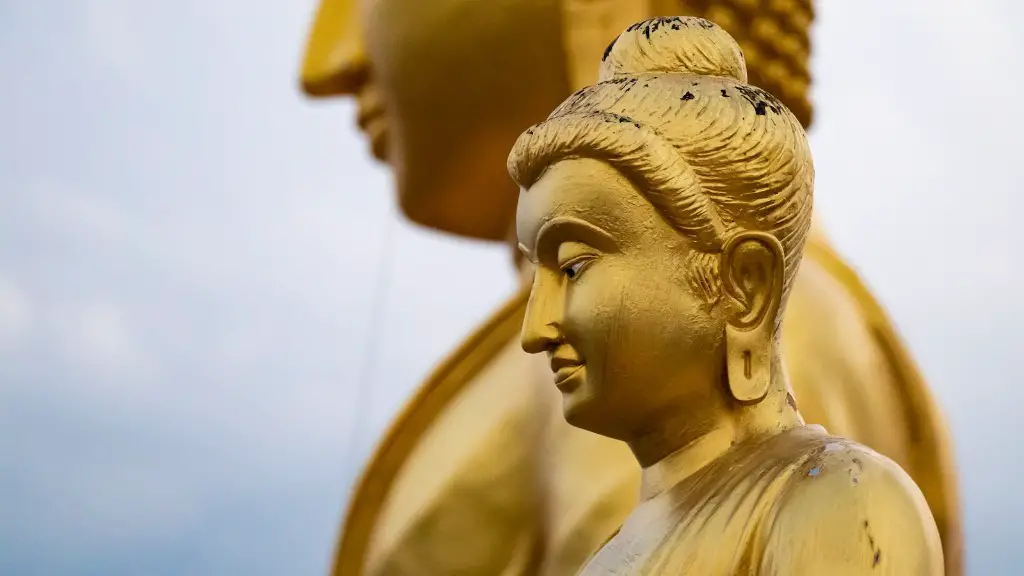Buddhism is a religion and philosophical tradition that originated in India. Buddhists seek to cultivate the wisdom and compassion of the Buddha, or awakened one, within themselves. The core beliefs of Buddhism are often summarized in the Four Noble Truths and the Noble Eightfold Path.
The core beliefs of Buddhism are the Four Noble Truths, the doctrine of rebirth, and the Noble Eightfold Path.
What are the 3 core beliefs of Buddhism?
Buddhism is a religion that is based on the teachings of Siddhartha Gautama. The main principles of this belief system are karma, rebirth, and impermanence.
Karma is the belief that our actions have consequences, both good and bad. We are each responsible for our own karma and it will determine our future lives.
Rebirth is the belief that we are reborn into different life forms after we die. This cycle of birth and death is called samsara. We can only be liberated from this cycle by achieving nirvana.
Impermanence is the belief that everything is constantly changing and nothing is permanent. This includes our thoughts, feelings, and experiences.
The Five Precepts are a set of guidelines for living a moral and ethical life. The precepts are: refrain from taking life, refrain from taking what is not given, refrain from the misuse of the senses, refrain from wrong speech, and refrain from intoxicants that cloud the mind.
What are the core values of Buddhism
Buddhists believe in the Four Noble Truths, which state that suffering is real, that suffering has a cause, that suffering can be ended, and that there is a path to the end of suffering. According to the Buddha, the cause of suffering is attachment. Attachment leads to craving and craving leads to suffering. The path to the end of suffering is the Eightfold Path, which includes right understanding, right thought, right speech, right action, right livelihood, right effort, right mindfulness, and right concentration.
The Four Noble Truths are the foundation of the Buddhist teachings. They are the truth of suffering, the truth of the cause of suffering, the truth of the end of suffering, and the truth of the path that leads to the end of suffering. More simply put, suffering exists; it has a cause; it has an end; and it has a cause to bring about its end.
The first Noble Truth is that suffering exists. This is not to say that life is suffering, but that suffering is a part of life. Suffering can take many forms, such as physical pain, emotional anguish, or simply the frustration of not getting what we want.
The second Noble Truth is that the cause of suffering is attachment. We suffer because we are attached to things that we cannot control, such as our own bodies, the people in our lives, or material possessions. When we lose something that we are attached to, or when things don’t go the way we want them to, we suffer.
The third Noble Truth is that suffering can end. This is not to say that life will become perfect and free of all problems, but that we can reach a state where we are no longer controlled by our attachments and desires. This state is
Do Buddhist believe in God?
Buddhism is a tradition focused on spiritual liberation rather than on belief in a creator god. The Buddha himself rejected the idea of a creator god, and Buddhist philosophers have even argued that belief in an eternal god is nothing but a distraction for humans seeking enlightenment.
The Buddha realized that the root cause of suffering is our attachment to things that are impermanent. We suffer because we want things to last forever, but everything is transient. The Buddha taught that the only way to end suffering is to let go of our attachment to things that don’t last.
The Buddha also taught that there is no such thing as a permanent, unchanging self. We suffer because we identify with things that are constantly changing. The only way to end suffering is to let go of our attachment to our own self.
What are the 7 pillars of Buddhism?
The Seven Factors of Awakening are important mental capacities in Buddhist tradition. Also known as “inner wealth”, these factors are mindfulness, investigation, energy, joy, tranquility, concentration, and equanimity. Each one of these factors plays a key role in the path to awakening and enlightenment.
Buddhism is a religion founded by Siddhartha Gautama, or “the Buddha,” over 2,500 years ago in India. With almost 470 million followers, experts consider Buddhism one of the major world religions. The Buddha taught that the way to end suffering is to end our desires and attachments. Buddhist practice emphasizes ethics, meditation, and wisdom.
What are Buddhist not allowed to do
The precepts are basic guidelines for living a moral and meaningful life according to the teachings of the Buddha. They are meant to help us develop our character and mind so that we can progress on the path to enlightenment. The five precepts are:
1. Abstain from killing living beings.
2. Abstain from stealing.
3. Abstain from sexual misconduct.
4. Abstain from lying.
5. Abstain from intoxication.
These precepts are not meant to be rigid rules, but rather guidelines to help us live a more meaningful and ethical life. If we can live by these precepts, we will be on the right path to achieving enlightenment.
Buddhism and Christianity are two very different religions. Christianity is a monotheistic religion that believes in one God who created the world and provides divine values for it. Buddhism, on the other hand, is a non-theistic religion that does not believe in a Creator God. Instead, Buddhism focuses on personal spiritual growth and enlightenment.
Do Buddhists believe in heaven?
In Buddhism, there is no concept of punishment or reward and there is no divine being who decides who goes to hell or heaven. There is merely the illusory results of our thought, words and deeds, which we call karma.
Death is not the end of life, but rather a continuation of the cycle of life, death and rebirth. Buddhists believe that consciousness (the spirit) continues after death and may be reborn. Death can be an opportunity for liberation from the cycle of life, death and rebirth.
Do Buddhists drink alcohol
Buddhism has always been against the over-consumption of alcohol, as it is seen as a hindrance to achieving enlightenment. Although there is no strict rule against drinking alcohol, most Buddhists believe that it should be avoided as it can lead to addiction and drunkenness. In recent years, some temples and monasteries have even banned alcohol completely.
The Buddhist teachings on devas and other deities are very interesting. I like how it teaches that none of these beings are eternal or creators, but that they can live long lives. This is a great way to view the world and our place in it.
What are the 10 rules of Buddhism?
The Ten Grave Precepts are the basis of Buddhist moral teaching. They are:
1. Respect life – Do not kill
2. Be giving – Do not steal
3. Honor the body – Do not misuse sexuality
4. Manifest truth – Do not lie
5. Proceed clearly – Do not cloud the mind
6. See the perfection – Do not speak of others’ errors and faults
7. Realize self and others as one – Do not elevate the self and blame others
The Eightfold Path is a guide to living a life that is in line with the Buddha’s teachings. It is a path that leads to liberation from suffering. The first step is to develop Right Understanding, which requires you to accept the Buddha’s teachings about life, death and suffering. The second step is to develop Right Emotion, which includes cultivating positive emotions such as love, compassion, joy and equanimity. The third step is to develop Right Speech, which involves speaking truthfully, kindly and respectfully. The fourth step is to develop Right Action, which includes acting in ways that are helpful and harmful. The fifth step is to develop Right Livelihood, which means earning a living in a way that does not cause suffering. The sixth step is to develop Right Effort, which includes making a sincere effort to grow and develop spiritually. The seventh step is to develop Right Awareness, which is a state of mind in which one is aware of the present moment and the true nature of reality. The eighth and final step is to develop Right Meditation, which is the practice of mindfulness and concentration.
Warp Up
Buddhism is a religion and philosophy founded in India by Siddhartha Gautama (the Buddha) more than 2,500 years ago. Buddhism covers a wide range of traditions, beliefs and spiritual practices largely based on original teachings attributed to the Buddha and resulting interpreted philosophies. Buddhism originated in Northern India in the 5th century BCE and spread throughout Asia. Two major extant branches of Buddhism are generally recognized by scholars: Theravada (Pali: “The School of the Elders”) and Mahayana (“The Great Vehicle”).
Buddhism’s core beliefs are its Four Noble Truths, which state that life is suffering, that suffering has a cause, that suffering can be ended, and that there is a path to the end of suffering.




